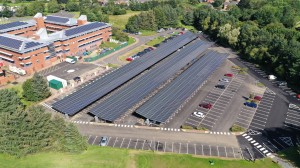 Northumberland County Council is celebrating the launch of a solar car port array at County Hall in Morpeth.
Northumberland County Council is celebrating the launch of a solar car port array at County Hall in Morpeth.
The project includes a covered parking area with a canopy made from photovoltaic (PV) panels that also provides weather protection for electric vehicles. It is one of the largest car port array installations in the UK with 800kW solar panels and it includes a 400kW battery with smart controls to optimise energy use, carbon emissions and costs throughout the day. The system was designed and built by UK Power Networks Services.
The investment is part-funded by the England European Regional Development Fund as part of the European Structural and Investment Funds Growth Programme 2014-2020 with match-funding from the council, which it plans to recoup through energy savings. The council expects to save between £100,000 and £150,000 on energy costs each yearand cut carbon emissions by 250t annually.
The solar panels will be used to power the main building, provide electricity to electric vehicle (EV) charge points for fleet and staff vehicles and stored to help optimise costs and carbon efficiency.
The 40-year old staff car park has been refurbished and 120 EV charge points have been installed, including 100 fast chargers and 20 rapid chargers including some dedicated for accessible parking bays. Additional rapid charge and overnight charging options are also now in place for the Council’s fleet vehicles.
David Mitchell, director of UK Power Networks Services said: “We are delighted to be delivering such a pivotal project for Northumberland County Council to assist in their objective of reducing carbon emissions in half by 2025. This solar energy infrastructure is one of the largest solar car port installations in the UK and will change the way the Council’s fleet operate to reduce cost and improve carbon efficiency.”
The council plans to use this model to test the suitability of installing similar solutions in other public car parks in the county to reduce costs, meet carbon targets and also improve the resilience of energy supplies
The project is receiving up to £1,940,616.00 of funding from the England European Regional Development Fund as part of the European Structural and Investment Funds Growth Programme 2014-2020.